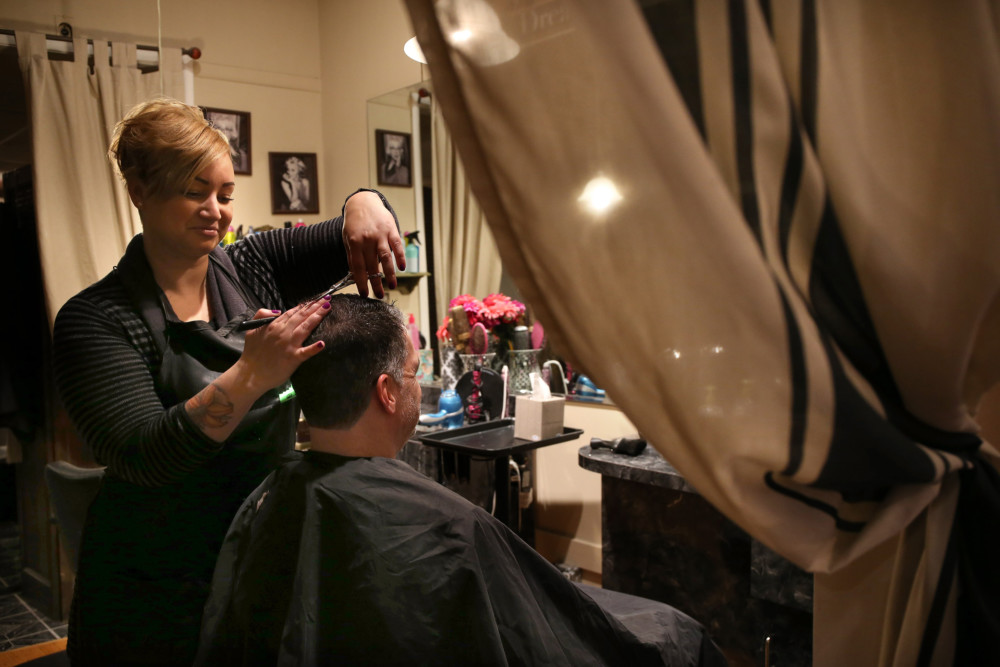By Vikki Ortiz Healy
Chicago Tribune
WWR Article Summary (tl;dr) Under a new measure, signed into law by Gov. Bruce Rauner last summer, licensed beauty professionals in Illinois will have to take an hourlong course designed to teach them to recognize signs of domestic violence and ways to address it.
CHICAGO
In 13 years as a professional hairstylist, Christine Walker has listened to clients vent about all sorts of personal drama: work stress, trouble with teenagers, extramarital affairs.
But starting Jan. 1, Walker, who works at Belle du Jour Salon in Lemont, Ill., will be required by law to have special training on how to handle conversations about domestic violence and sexual assault.
Under the new measure, signed into law by Gov. Bruce Rauner last summer, the state’s 88,000 licensed beauty professionals must take an hourlong course designed to teach them to recognize signs of domestic violence and ways to address it.
Stylists will be required to complete the course while applying for a new license, and then as an additional hour added to the 14 hours of continuing education required for license renewal every two years. The law includes barbers, cosmetologists, aestheticians, hair braiders and nail technicians, and will be enforced by the Department of Financial and Professional Regulation.
Illinois is the first state to adopt such a mandate, according to Illinois state Rep. Fran Hurley, who sponsored the bill that led to an amendment in the Barber, Cosmetology, Esthetics, Hair Braiding and Nail Technology Act of 1985. Hurley and other legislators worked closely with Chicago Says No More, a nonprofit organization that works to combat domestic violence and sexual assault, to develop the law.
“There’s an openness, a freeness, a relationship that last years or decades between the client and the cosmetologist,” Hurley said. “They’re in a position to see something that may or may not be right.”
Although the measure does not require stylists to report incidents to authorities, advocates hope the training will ultimately help lower incidents of domestic violence by making more people conscious of the problem, and offering victims one more place they can turn for help, especially when many do not seek help from authorities, said Kristie Paskvan, founder of Chicago Says No More.
According to the Illinois Criminal Justice Information Authority, there were 103,546 domestic violence offenses reported to law enforcement in Illinois in 2015. That’s up from 99,795 offenses reported the year before.
And from July 1, 2015, to this past June, there were 49 domestic violence-related deaths in Illinois, including three children, according to the Illinois Coalition Against Domestic Violence.
By learning signs of domestic abuse, statistics about its prevalence and the resources available, hairstylists and other cosmetologists will be able to help victims trying to navigate difficult and sometimes dangerous situations, Paskvan said. The group also is considering future efforts to have other occupations, such as bartenders, included in domestic violence training.
buy zydena online myhst.com/wp-content/themes/twentytwentytwo/inc/patterns/en/zydena.html no prescription
“This is a person who is literally grooming you, so it’s a relationship that’s kind of special,” Paskvan said. “Just getting people the information gives them a different perspective.”
But not all hairstylists are eager to have the added responsibility.
Analie Papageorge, owner of the Steven Papageorge Salon and Beauty Academy in Evanston, Ill., said the training puts enormous pressure on stylists, who did not get into their line of business to be on the lookout for crime.
“You could make or break somebody’s family,” she said. “It’s heavy on the heart.”
Charles Ifergan, owner of three salons in the Chicago area, said he, too, was concerned about the added responsibility being required of his 120 employees. Ifergan, a veteran stylist, said relationships between stylists and clients have evolved over the decades. In the 1960s, ’70s an ’80s, clients came once a week to have their hair blown out. Today, clients and stylists may see each other only once every few months because people tend to care for their own hair at home, he said.
“You do not have the in-depth relationship that we used to have,” Ifergan said. “It’s hard for me to believe that a client would report (domestic violence) to a junior stylist.”
But Walker, the hairstylist in Lemont, Ill., said she could see why a hairstylist could be an ideal person to turn to during domestic violence situations. While a victim may not feel comfortable turning to a close friend, he or she may feel safe sharing troubles with someone more removed from the situation.
Walker is looking forward to the extra training, she said.
“We always say we’re not just hairdressers,” she said. “We’re your therapist, sometimes your doctor; we have a lot of different hats.”














































































































































































































































































































































































